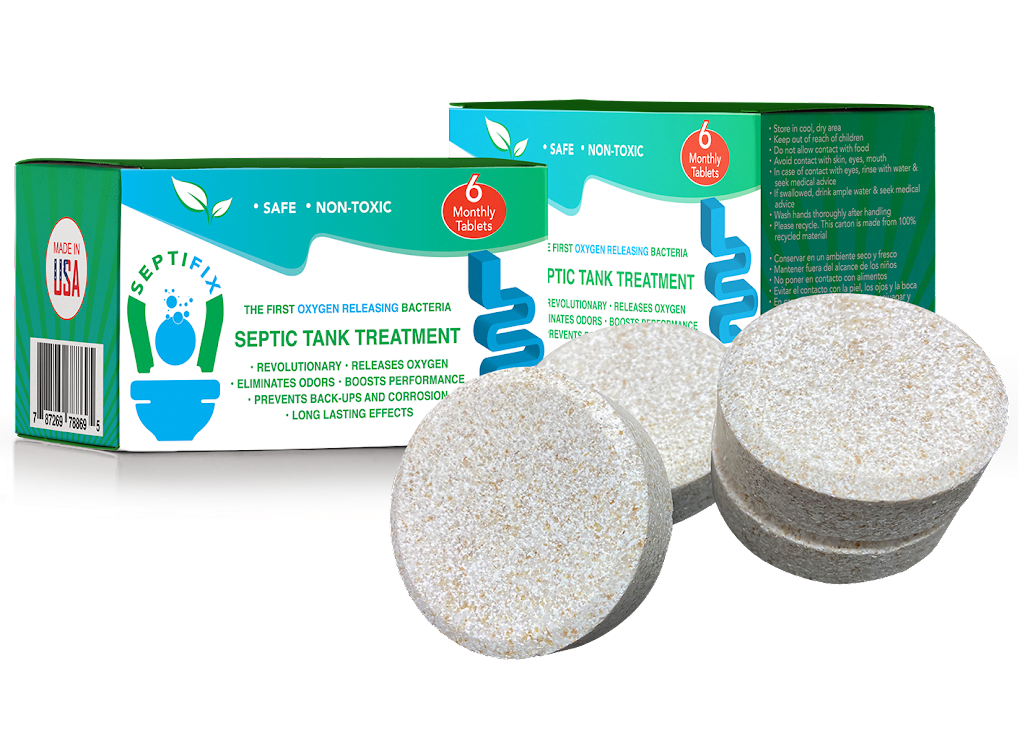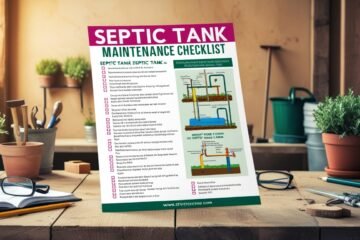Septic tank systems are a common wastewater treatment method for homes not connected to a municipal sewer system. These systems consist of a septic tank, an underground container that holds and treats the wastewater, and a drain field, a leach field, a network of pipes that distributes the treated wastewater into the soil.
Maintaining a healthy septic system is crucial for the overall health and well-being of your home and the environment. A malfunctioning septic system can lead to costly repairs, environmental contamination, and potential health hazards. Regular maintenance and proper care of your septic tank system and drain field are essential to ensure longevity and effectiveness.
Key Takeaways
- The drain field is a crucial component of a septic tank system. It filters and disperses wastewater into the soil.
- Slow-draining fixtures, foul odors, and standing water in the yard are signs of septic drain field problems.
- Regular septic tank pumping is essential for maintaining a healthy drain field and preventing costly repairs.
- Choosing a reputable septic tank pumping service and avoiding common maintenance mistakes can help extend the lifespan of your drain field.
- If you have a challenging property or are experiencing persistent drain field issues, alternative drain field options or professional repairs may be necessary.
Understanding the Role of the Drain Field in Septic Tank Systems
The drain field plays a vital role in the functioning of a septic tank system. Once the wastewater is treated in the septic tank, it flows into the drain field through perforated pipes. The drain field is typically underground and consists of gravel or other porous materials that allow the treated wastewater to be absorbed into the soil.
Proper drainage is crucial for a healthy septic system. If the drain field becomes clogged or overloaded with wastewater, it can lead to backups, foul odors, and even sewage in your yard. It is important to ensure that the drain field has adequate space and proper soil conditions to absorb and filter the wastewater effectively.

SEPTIFIX will save you hundreds, if not thousands of dollars each year, because your septic system will run smoothly and you won’t have to worry about calling the pumpers or a plumber for a fix!
Click here to save up to 50%
Signs of Septic Drain Field Problems
Several signs indicate potential problems with your septic drain field. It is important to be aware of these signs so that you can take prompt action to address any issues before they escalate.
One common sign of drain field problems is foul odors. If you notice a strong sewage smell in your yard or near your drains, it could indicate your drain field is malfunctioning. Slow-draining sinks and toilets are another sign of drain field issues. If you experience frequent backups or notice that water is taking longer than usual to drain, it could be a sign that your drain field cannot handle the volume of wastewater.
Another red flag is standing water in your yard, especially around the drain field area. This could indicate that the drain field is saturated and unable to absorb the wastewater properly. Gurgling sounds in your pipes can also indicate drain field problems. If you hear unusual noises when you flush the toilet or run water down the drains, it could indicate a blockage or backup in the drain field.
Tips for Maintaining a Healthy Septic Drain Field
| Tips for Maintaining a Healthy Septic Drain Field |
|---|
| 1. Pump your septic tank every 3-5 years |
| 2. Use water efficiently to avoid overloading the system |
| 3. Don’t flush non-biodegradable items down the toilet |
| 4. Avoid pouring grease or oil down the drain |
| 5. Keep heavy vehicles and equipment off the drain field |
| 6. Plant grass or other shallow-rooted plants over the drain field |
| 7. Inspect the system regularly for leaks or damage |
Regular maintenance and proper care are essential for maintaining a healthy septic drain field. Here are some tips to help you keep your drain field in good condition:
1. Regular inspections: Schedule regular inspections of your septic system by a professional to ensure everything functions properly. They can check for any signs of damage or potential issues and recommend maintenance or repairs.
2. Proper waste disposal: Be mindful of what you flush down the toilet or pour down the drains. Avoid flushing non-biodegradable items such as wipes, feminine hygiene products, or paper towels, as they can clog the pipes and cause damage to the drain field.
3. Conserving water: Excessive water usage can overload your septic system and strain the drain field. Be mindful of your water consumption and try to conserve it whenever possible. Fix leaks promptly, and consider installing low-flow fixtures to reduce water usage.
4. Avoid harsh chemicals: Harsh chemicals such as bleach, drain cleaners, or antibacterial soaps can disrupt the natural balance of bacteria in your septic system and harm the drain field. Opt for environmentally friendly cleaning products and avoid pouring chemicals down the drains.
Regular Septic Tank Pumping: Why It’s Important
Regular septic tank pumping is an essential part of septic system maintenance. Over time, solid waste and sludge accumulate in the septic tank, leading to clogs, backups, and potential damage to the drain field. Pumping the septic tank removes the accumulated waste and helps maintain a healthy balance in the system.
During a septic tank pumping, a professional will use a vacuum truck to remove the solid waste and sludge from the tank. The frequency of septic tank pumping depends on several factors, including the size of the tank, the number of occupants in the house, and the volume of wastewater generated. As a general guideline, pumping your septic tank every 3-5 years is recommended.
Regular septic tank pumping is important for several reasons. First, it helps prevent clogs and backups in your plumbing system. When the septic tank is too full, wastewater can return to your sinks, toilets, or showers. This can be inconvenient, unsanitary, and potentially hazardous to your health.

SEPTIFIX will save you hundreds, if not thousands of dollars each year, because your septic system will run smoothly and you won’t have to worry about calling the pumpers or a plumber for a fix!
Click here to save up to 50%
Secondly, regular pumping helps prevent damage to the drain field. When the septic tank is not pumped regularly, solid waste and sludge can flow into the drain field, clog the pipes, or saturate the soil. This can lead to costly repairs or even require replacement of the entire drain field.
Choosing the Right Septic Tank Pumping Service
When it comes to septic tank pumping, choosing a reputable and experienced service provider is important. Here are some factors to consider when selecting a pumping service:
1. Licensing and certifications: Ensure the pumping service is licensed and certified by the appropriate authorities. This ensures they have met certain standards and regulations for septic system maintenance.
2. Experience and reputation: Look for a pumping service that has been in business for a long time and has a good reputation in the industry. Read reviews and ask for recommendations from friends or neighbors who have used their services.
3. Equipment and technology: Inquire about the equipment and technology used by the pumping service. A reputable company should have modern, well-maintained equipment to ensure efficient and effective pumping.
4. Pricing and services: Compare prices and services offered by different pumping companies. Be wary of extremely low prices, which may indicate subpar service or hidden fees. Look for a company that offers transparent pricing and a comprehensive range of services.
Common Mistakes to Avoid When Maintaining Your Septic Drain Field
Proper maintenance and care are crucial for the longevity and effectiveness of your septic drain field. Here are some common mistakes to avoid:
1. Flushing non-biodegradable items: Avoid flushing them down the toilet, as they can clog the pipes and cause damage to the drain field. Stick to flushing only toilet paper and human waste.
2. Overuse of water: Excessive water usage can overload your septic system and strain the drain field. Be mindful of your water consumption and try to conserve it whenever possible. Fix any leaks promptly and consider installing low-flow fixtures to reduce water usage.
3. Parking or building on the drain field: The drain field should be clear of any heavy objects or structures. Parking vehicles or building structures on the drain field can compact the soil, disrupt the drainage process, and potentially damage the pipes.
How to Extend the Lifespan of Your Septic Drain Field
Proper maintenance and care can significantly extend the lifespan of your septic drain field. Here are some tips to help you keep your drain field in good condition:
1. Regular inspections: Schedule regular inspections of your septic system by a professional to ensure everything functions properly. They can check for any signs of damage or potential issues and recommend maintenance or repairs.
2. Proper waste disposal: Be mindful of what you flush down the toilet or pour down the drains. Avoid flushing non-biodegradable items such as wipes, feminine hygiene products, or paper towels, as they can clog the pipes and cause damage to the drain field.
3. Conserving water: Excessive water usage can overload your septic system and strain the drain field. Be mindful of your water consumption and try to conserve it whenever possible. Fix leaks promptly, and consider installing low-flow fixtures to reduce water usage.
4. Avoid harsh chemicals: Harsh chemicals such as bleach, drain cleaners, or antibacterial soaps can disrupt the natural balance of bacteria in your septic system and harm the drain field. Opt for environmentally friendly cleaning products and avoid pouring chemicals down the drains.
Alternative Drain Field Options for Challenging Properties
In some cases, traditional drain fields may not be suitable for certain properties due to high water tables, poor soil conditions, or limited space. In such situations, alternative drain field options may be necessary. Here are some alternative options to consider:
1. Mound systems: Mound systems are designed for properties with high water tables or poor soil conditions. They involve building an elevated mound of sand or gravel above the natural soil surface, which provides additional filtration and treatment of the wastewater before it is absorbed into the soil.
2. Aerobic treatment units (ATUs): ATUs are advanced septic systems that use oxygen to break down and treat wastewater more efficiently than traditional septic tanks. They are suitable for properties with limited space or challenging soil conditions.
3. Drip irrigation systems: Drip irrigation systems distribute treated wastewater through a network of small tubes or emitters, which release the water slowly and evenly into the soil. They are ideal for properties with limited space or soil conditions unsuitable for traditional drain fields.

SEPTIFIX will save you hundreds, if not thousands of dollars each year, because your septic system will run smoothly and you won’t have to worry about calling the pumpers or a plumber for a fix!
Click here to save up to 50%
When to Call a Professional for Septic Drain Field Maintenance and Repairs
While regular maintenance and care can help prevent many issues with your septic drain field, there may be times when professional help is needed. Here are some signs that indicate it is time to call a professional:
1. Persistent foul odors: If you notice persistent foul odors in your yard or near your drains, it could be a sign of a serious issue with your drain field. A professional can inspect the system and determine the cause of the odor.
2. Frequent backups or slow drains: If you experience frequent backups or notice water taking longer than usual to drain, it could indicate a blockage or backup in the drain field. A professional can identify the cause of the problem and provide the necessary repairs.
3. Standing water in the yard: If you have standing water in your yard, especially around the drain field area, it could indicate that the drain field is saturated and unable to absorb the wastewater properly. A professional can assess the situation and recommend appropriate solutions.
4. Gurgling sounds in pipes: Unusual gurgling sounds when you flush the toilet or run water down the drains indicate a blockage or backup in the drain field. A professional can inspect the system and clear any obstructions.
Maintaining a healthy septic system is crucial for the overall health and well-being of your home and the environment. Regular inspections, proper waste disposal, water conservation, and avoiding harsh chemicals are all important aspects of septic system maintenance. Regular septic tank pumping is also essential to prevent clogs, backups, and potential damage to the drain field.

SEPTIFIX will save you hundreds, if not thousands of dollars each year, because your septic system will run smoothly and you won’t have to worry about calling the pumpers or a plumber for a fix!
Click here to save up to 50%
Choosing a reputable septic tank pumping service is important to ensure the job is done properly and efficiently. Avoid common mistakes such as flushing non-biodegradable items, overusing water, or parking/building on the drain field. By following these tips and taking proactive measures, you can extend the lifespan of your septic drain field and avoid costly repairs or replacements.
In some cases, alternative drain field options may be necessary for properties with challenging conditions. Mound systems, aerobic treatment units (ATUs), and drip irrigation systems are alternatives to consider. If you notice persistent issues with your septic drain field, it is important to promptly call a professional for maintenance and repairs to prevent further damage. You can enjoy a healthy and efficient septic system for years by taking action and ensuring proper maintenance.
If you’re interested in learning more about septic drain fields, you may find the article “Problem #9: Heavy Equipment Damage – Protecting the Unseen Lifeline Below” on myseptictank.com quite informative. This article discusses the importance of safeguarding your septic drain field from potential damage caused by heavy equipment. It provides valuable insights and tips on how to protect this vital component of your septic system. To read the full article, click here.
FAQs
What is a septic drain field?
A septic drain or leach field is a septic system component responsible for wastewater’s final treatment and disposal.
How does a septic drain field work?
A septic drain field allows wastewater to flow from the septic tank into a series of perforated pipes buried in a designated area. The wastewater then seeps through the perforations into the surrounding soil, where it is naturally filtered and treated.
What are the signs of a failing septic drain field?
Signs of a failing septic drain field include slow-draining sinks and toilets, foul odors, standing water or wet spots in the drain field area, and sewage backups in the home.
What causes a septic drain field to fail?
A septic drain field can fail for various reasons, including overuse, lack of maintenance, soil compaction, tree root intrusion, and damage to the pipes.
How can a septic drain field be maintained?
A septic drain field can be maintained by regularly pumping the septic tank, conserving water usage, avoiding flushing non-biodegradable items down the toilet, and avoiding planting trees or shrubs near the drain field area.
What should I do if my septic drain field fails?
If your septic drain field fails, contact a licensed septic professional to assess the situation and determine the best course of action. In some cases, the drain field may need to be replaced.


